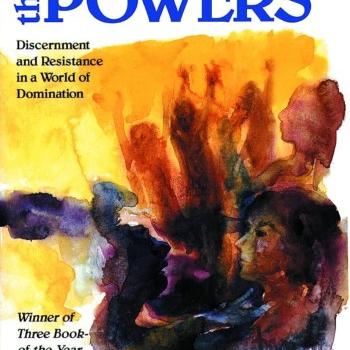The Latin title here is an inversion of the Catholic/Orthodox dogma extra ecclesiam nulla salus, which means there is/there can be no salvation outside the church. (They can both be wrong, but they can’t both be right about that. To be fair, though, this troubling idea is also dogma in lots of churches, including some very sect-y nondenominational ones, where nobody uses Latin.)
The inversion means, of course, that there is/can be no salvation inside the church.
Here’s how I began the first post with this Latin title a couple of years ago:
In white America, there is no salvation inside the church.
The white American church is Bad. It makes people worse than they otherwise would be — more sinful, m0re lost. It is not merely a valley of dry bones, it is the machine that turns living flesh into dry bones.
Shut it down. Burn it down.
This is not hyperbole or exaggeration. Stretch as far as you can and you cannot reach those here. The fruit of white church is rotten. It’s toxic. It brings death and pain and blasphemy.
That’s sweeping and categorical, but not more so than 1 John 4.
I wrote that in response to appalling survey findings showing that attending white church in America turned adherents of those churches into anti-disciples. Specifically, the survey showed that the more people go to white church, the less likely they are to see any responsibility to welcome the stranger, the poor, the widow, orphan, or refugee. The more they claim to love White Jesus, the less likely they are to love their neighbor.
That survey showed that white churches are a bad tree that provides only bad fruit.
Now I read of another similar survey. It’s results are as appalling as they are unsurprising. This is data that provides, as the old joke puts it, “statistical confirmation of the known.” The article here — “Racism among white Christians is higher than among the nonreligious. That’s no coincidence.” — is an “opinion” piece by Pew researcher Robert L. Jones, but the data doesn’t measure his opinion, it measures the opinions of white Christians.
Compared to nonreligious whites, white Christians register higher median scores on the Racism Index, and the differences among white Christian subgroups are largely differences of degree rather than kind.
… White evangelical Protestants have the highest median score (0.78) on the Racism Index. But it is a mistake to see this as merely a Southern or an evangelical problem. The median scores of white Catholics (0.72) and white mainline Protestants (0.69) — groups that are more culturally dominant in the Northeast and the Midwest — are not far behind. Notably, the median score for each white Christian subgroup is significantly above the median scores of the general population (0.57), white religiously unaffiliated Americans (0.42) and Black Protestants (0.24).
This disparity in attitudes about systemic racism between white Christians and whites who claim no religious affiliation is important evidence that the common — and catalyzing — denominator here is religious identity. …
… Even when controls are introduced in a statistical model for a range of demographic characteristics, such as partisanship, education levels and region, the connection between holding racist attitudes and white Christian identity remains stubbornly robust.
The results point to a stark conclusion: While most white Christians think of themselves as people who hold warm feelings toward African Americans, holding racist views is nonetheless positively and independently associated with white Christian identity. Again, this troubling relationship holds not just for white evangelical Protestants, but also for white mainline Protestants and white Catholics.
Moreover, these statistical models refute the assertion that attending church makes white Christians less racist. Among white evangelicals, in fact, the opposite is true: The relationship between holding racist views and white Christian identity is actually stronger among more frequent church attenders than among less frequent church attenders.
Or, to paraphrase 1 John, if you wish to know God, you would be wise never to set foot inside a white church. Attending such a church is very, very dangerous. It places your soul in eternal peril.

Butbutbutbut … surely not all white churches? Surely not all white Christians? “Will you indeed sweep away the just with the wicked?”
That’s a legitimate question and legitimate objection now just as it was when Abraham asked it of God, pleading for divine mercy toward his enemies. But here we are, now, in that same place, and the best we can offer on behalf of America’s white church is the argument Abraham offered on behalf of Sodom:
Then Abraham came near and said, “Will you indeed sweep away the righteous with the wicked? Suppose there are 50 just people within the white church; will you then sweep away the place and not forgive it for the 50 just who are in it? Far be it from you to do such a thing, to slay the righteous with the wicked, so that the righteous fare as the wicked! Far be that from you! Shall not the Judge of all the earth do what is just?”
And the Lord said, “If I find 50 righteous in the white church, I will forgive the whole place for their sake.”
Abraham answered, “Let me take it upon myself to speak to the Lord, I who am but dust and ashes. Suppose five of the 50 righteous are lacking? Will you destroy the whole white church for lack of five?”
And he said, “I will not destroy it if I find 45 there.”
Again he spoke to him, “Suppose 40 are found there.”
He answered, “For the sake of 40 I will not do it.”
Then he said, “Oh do not let the Lord be angry if I speak. Suppose 30 are found there.”
He answered, “I will not do it, if I find 30 there.”
He said, “Let me take it upon myself to speak to the Lord. Suppose 20 are found there.”
He answered, “For the sake of 20 I will not destroy it.”
Then he said, “Oh do not let the Lord be angry if I speak just once more. Suppose 10 are found there.”
He answered, “For the sake of 10 I will not destroy it.”
And the Lord went his way, when he had finished speaking to Abraham; and Abraham returned to his place.












